Toyota Corolla (E110)
The Corolla E110 was the eighth generation of cars sold by Toyota under the Corolla nameplate.
| Toyota Corolla (E110) | |
|---|---|
 | |
| Overview | |
| Manufacturer | Toyota |
| Also called |
|
| Production |
|
| Model years | 1998–2002 (North America) |
| Assembly |
|
| Designer | Takayasu Honda (1992) |
| Body and chassis | |
| Class | Subcompact car (B) |
| Body style | |
| Layout | Front-engine, front-wheel-drive or four-wheel-drive |
| Related | Toyota Corolla Spacio (E110) |
| Powertrain | |
| Engine |
|
| Transmission | |
| Dimensions | |
| Wheelbase | 2,465 mm (97.0 in)[2] |
| Length |
|
| Width | 1,690 mm (67 in)[2] |
| Height |
|
| Curb weight |
|
| Chronology | |
| Predecessor | Toyota Corolla (E100) |
| Successor |
|
Introduced in May 1995, the eighth generation shared its platform (and doors, on some models) with its predecessor. Due to a recession at the time, Toyota ordered Corolla development chief Takayasu Honda to cut costs, hence the carry-over engineering.
For the general market, the Corolla was offered in Base, XLi, GLi and SE-G trim levels.
Japan
.jpg.webp)
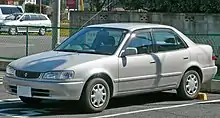
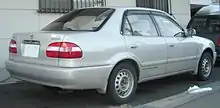
_BZ-R_coupe_01.jpg.webp)

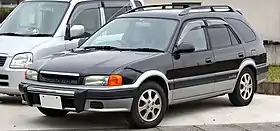

This was the last Corolla generation to have an equivalent Sprinter model, and the Levin sports package upgrade. The Sprinter Carib wagon was identical to the European Corolla wagon and was only available in Japan as a Sprinter. The previous generation E104 Corolla Touring Wagon continued to be sold alongside it. The Sprinter, exclusive to Toyota Auto Store Japanese dealerships was renamed the Toyota Allex and was modified from a sedan to five-door hatchback.
Japanese models received minor changes in April 1997 with new nose, tail and interior. The rear panel is totally different, therefore the trunk and tail lights are not interchangeable between the old and facelift models. The new Japanese rear panel is the same as the European model. Japanese models were replaced by the E120 in 2000.
Japanese market engines:
- 4E-FE – 1.3 L (1331 cc) I4, 16-valve DOHC, FI, 88 PS (65 kW)
- 5A-FE – 1.5 L (1498 cc) I4, 16-valve DOHC, FI, 100 PS (74 kW)
- 4A-FE – 1.6 L (1587 cc) I4, 16-valve DOHC, FI, 115 PS (85 kW)
- 4A-GE – 1.6 L (1587 cc) I4, 20-valve DOHC, FI, 165 PS (121 kW)
- 2C-III – 2.0 L (1974 cc) I4, diesel, FI, 73 PS (54 kW)
- 3C-E – 2.2 L (2184 cc) I4, diesel, EFI, 79 PS (58 kW)
Southeast Asia
.jpg.webp)
.JPG.webp)
%252C_South_Tangerang.jpg.webp)
Indonesia
This generation of the Corolla was launched in December 1995. Initially it was offered in XLi, SE-G, and S-Cruise grades, all powered by the 1.6-liter 4A-FE engine. The SE-G and S-Cruise came standard with a driver airbag, which made them the first cars to offer this safety equipment in the Indonesian compact car segment.
The facelifted 1.8 XLi and 1.8 SE-G came in April 1998. In addition to the newer 1.8-liter 7A-FE engine, the Corolla received new front and rear body panels and upgraded interior. The SE-G also came standard with ABS and an additional passenger airbag.
On the island of Batam, where used imports from Singapore are popular, the Corolla GLi E110 is one of the most common models, in the private car[3] and taxi[4] segment. Together with the local XLi and SE-G, the Singaporean GLi are common sights in this island. The majority of the E110s are the facelifted North American/Japan/Asian models, although there are a few pre-facelift 1995 models.
Malaysia
In Malaysia, the E110 series Corolla was offered in two grades from February 1996, GLi and SE-G. Both were powered by the 1.6-liter 4A-FE engine. The SE-G and GLi came standard with airbags. 7330 Corollas were built in Malaysia in 1996.[5]
A facelift was offered in 2 grades, SE-G and GLi variants was offered in April 1998. In addition to the bigger 1.8-liter 7A-FE Hi-Torq engine, the Corolla received new front and rear body panels, upgraded interior, and ABS was also standard on the SE-G.
Philippines
In the Philippines, the E110 Corolla, nicknamed "Love Life" or "Baby Altis", was launched in December 1997, and was originally available in three grades: XL, XE, and GLi. The 1.3L 2E and 1.6L 4A-FE engines, as well as the 5-speed manual and 4-speed automatic transmissions are carried over from the previous generation.
At introduction, the GLi was the top-of-the-line model, featuring a 1.6 L 4A-FE engine and trim-exclusive Red Mica body paint. This specification had power windows and locks, an optional spoiler, a digital clock with an Alpine 4-channel head unit, standard ABS, and TVSS (Toyota Vehicle Security System) keyless locks, and was available with either a 5-speed manual or 4-speed automatic transmission. A special variant named TOM'S Toyota Corolla Turbo that was based on the GLi trim was offered in 1999 through dealers where it sold body kits and a complete turbo kit for its 1.6 L 4A-FE engine developed by TOM'S.[6]
The 1.3 XE was a step up from the standard XL grade, adding dual SRS airbags, 14-inch alloy wheels, and a Fujitsu Ten 4-channel audio unit. This variant was only available with a 5-speed manual transmission.
The 1.3 XL was the Corolla's cheapest model at launch, equipped with basic features like a two-spoke polypropylene steering wheel, wind-up windows, 13" steel wheels, Fujitsu Ten 2-channel stereo, and 5-speed manual transmission. It was sold as rental cars and taxis alongside the E120 Corolla Altis until May 2004, when it was replaced by the newly launched Toyota Vios J variant.
In 1999, a new 1.3 LE trim was introduced, with comparable features to the XL and XE grades but with a 5-speed manual transmission and 14-inch alloy wheels; it was phased out in early 2003 and replaced by the Vios E and G trims.
The XE and GLi versions were redesigned in early 2000. The name 'Corolla Altis' was first applied to a new 1.8 SE-G trim with identical features to the GLi, including a new 1.8 L 7A-FE engine, modified front and rear body panels, a remodeled grill, and a 4-speed automatic transmission. All were available until mid-2001, with the exception of the XL and LE trims.
Toyota Motor Philippines also made an interactive CD brochure featuring the GLi, XE and XL models.
| Model | Engine type | Max. output | Max. torque |
|---|---|---|---|
| 1.3 L XE / XL / LE | SOHC 12V 2E (Carburetor) | 72 hp (53 kW) at 6,200 rpm | 101 N⋅m (74 lb⋅ft) at 4,200 rpm |
| 1.6 L GLi | DOHC 16V 4A-FE (EFI) | 110 hp (81 kW) at 6,800 rpm | 145 N⋅m (107 lb⋅ft) at 4,800 rpm |
| 1.8 L SE-G 'Altis' | DOHC 16V 7A-FE (EFI) | 120 hp (88 kW) at 6,000 rpm | 149 N⋅m (110 lb⋅ft) at 4,400 rpm |
Singapore
The E110 was one of the best-selling cars during its time in Singapore. It was commonly used as a taxicab there. Many of these cars were exported to Batam for use as taxis in the 2000s.
Thailand
In Thailand, the E110 series Corolla was launched in 1996. It was initially offered in GXi, SE-G and DXi trim levels — all were powered by the 1.6-liter 4A-FE engine. The SE-G and DXi came standard with airbags, which made them the first cars in the Thailand compact care segment to offer this safety equipment.
A facelift model appeared in April 1998, offered in two grades: GXi and SE-G. In addition to the bigger 1.8-liter 7A-FE Hi-Torq engine,[7] the facelifted Corolla received new front and rear body panels, upgraded interior, and ABS was standard on the SE-G.
North America

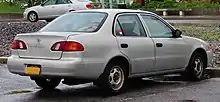
.jpg.webp)
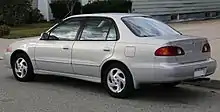
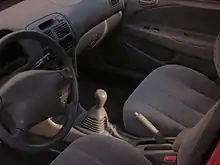
Introduced in 1997 for the 1998 model year, all Corollas for the North American market were built in Fremont, California (by NUMMI) or Cambridge, Ontario (by TMMC). Unlike the Japanese counterparts, the North American Corolla at the time was only offered as a four-door compact sedan. A newly developed all-aluminum 1ZZ-FE engine powered all Corollas, making this generation lighter than its predecessor. This new engine uses a timing chain instead of a timing belt. It also incorporated laser etched valve guides directly in the block, rather than the old shrink-to-fit valve guides in the preceding Corolla motors (4A-FE & 7A-FE). This prevents oil burning and valve guide failure in the future. Although these efforts theoretically would have decreased oil burn, a flawed piston ring design affected all engines without VVT-i. This poor design caused oil burning in higher mileage examples.[8]
In North America, only sedans were offered, and all came with day-time running lights. This Corolla has a maximum legal carrying capacity of 1,500 lb (680 kg)[9]. Trim levels are VE, CE and LE. The VE model was the base model available in a 3-speed automatic or the 5-speed manual transmission with 175/65R14 tires. The CE and LE models offered either the 4-speed automatic with overdrive or the 5-speed manual transmission with 185/65R14 tires, although some early Canadian market 1998 CEs came with a 4 speed automatic transmission, and 175/65R14 tires. Some options for the later model CE and LE models included a power sunroof, and an optional Touring Package. This package contained color matched side skirts, color matched rear mudflaps, a white faced instrument cluster with tachometer and outside temperature gauge, and aluminum wheels. Side airbags and ABS were optional for the CE and LE models, but very few cars had this option. The first batch of 1998 Corolla VE's did not have a front sway bar, but by June 1998 it was included on all models. VVT-i variable valve timing and individual coils for each cylinder were added to the engine in the 2000 model year with a small increase in power from 120 hp (89 kW) to 125 hp (93 kW) along with child seat anchors added on the rear deck. The then-recently introduced VVT-i optimizes cam and valve timing to reduce emissions, and the addition of individual coils for each cylinder helped control spark timing to each individual cylinder.
For the 2001 model year (2000 calendar year), the VE was replaced by a new S model. The CE now became a base model, still offered in 5-speed manual or 3-speed automatic transmission, and the sporty S served as the new Touring Package, which came with a 5-speed manual or 4-speed automatic transmission. The 2001 model year also got a slight refresh with the new front headlights/corner lights, redesigned front bumper, auxiliary DC power port with a higher armrest (LE and S models), inside trunk release for accidental lockouts in the trunk, new controls for the air conditioner that had the rear glass defrost button relocated with a button for the recirculation of air, and round reverse lights. The 'sportiness' of the S model built upon the VE models with a gauge cluster with tachometer in a red/black theme with an outside temperature gauge, the lightweight 3-spoke steering wheel used in the Toyota Celica and Matrix of the same model year, a charcoal gray and black interior with lighter seats, standard front fog lamps, color matched side skirts, color matched rear mudflaps, color matched door handles and side mirrors, a color matched front grill, a trunk release lever next to the gasoline cap door lever (but not on the remote fob), a trunk light, 14" S model wheel covers, and lighted map lights on the rear view mirror. The S model lacked the 60/40 folding rear seats in other models. Aside from the slightly larger tires and a slightly stiffened rear suspension for a minor improvement in handling, the S model had very minimal performance advantage (if any) over the other models; it was mainly a styling and appearance package, similar to the Touring Package it had replaced.
The 2002 model year was short-lived and was only produced until the end of 2001 to make way for the redesigned model which launched in early 2002 for the 2003 model year.
Official Toyota accessories available through dealerships for all trim levels of the eighth generation Corolla included: front-end mask, gold emblem package, color-keyed rear spoiler with center high-mount stop lamp, wheel covers, aluminum alloy wheels, wheel locks, mudguards, sunroof wind deflector (LE and S models only), genuine wood dash appliqué, carpeted floor mats, all-weather floor mats, carpeted trunk mat, trunk cargo net, Toyota VIP RS3000 remote keyless security system, 6-disc trunk-mounted CD changer, compact disc deck (fits in storage bin), and a 6-disc in-dash CD changer.[10]
North American market engines:
Europe, Middle East and Oceania

_Ascent_sedan_(2011-11-17)_01.jpg.webp)
_Ultima_sedan_(rear).jpg.webp)
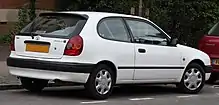
_Ascent_Seca_liftback_06.jpg.webp)

This range had different front and rear ends to the Japanese models, though the sides and interior remained mostly the same. It can be distinguished by the round headlights and mesh grille. As a result, a sporting model with a six-speed gearbox was offered. The European three-door hatchback is the base for the Corolla World Rally Car (WRC) that competed in the World Rally Championship from 1997 to 2000. Japanese production for Europe ended in September 2001, while Toyota's British plant built the E110 Corolla for an additional two months.
In Australia, the Corolla liftback is called Seca. Grades for sedan and Seca are Ascent, Conquest, and Ultima. New Zealand market E110s had the 1.3 L 4E, the 1.5 L 5A-FE, 1.6 L 4A-FE, 1.8 L 7A-FE petrol engines or the 2.2-litre 3C-E diesel engine as of 2000,[11] whereas Australia only offered the 7A-FE, with a unique turbocharged Sportivo model offered in 2001. In 1997, the Corolla Spacio, with its body panels stamped at long-time Toyota supplier Kanto Auto Works, was introduced as a two-box minivan version, which was technically similar to the Avensis in Europe. The E110 was the last generation of Corolla to have an upmarket Sprinter Carib offshoot; for Oceania this was based on the five-door station wagon. The 3-door hatchback was not sold in Japan, Australia or New Zealand.
In New Zealand, until late 1998, CKD kits were brought in from Japan and assembled in plants located in Thames and Christchurch. Locally produced components were also used, and included items such as tyres, seats, trims, and glass.
In the United Kingdom, the models were 1.3 and 1.6 GS, 1.6 GLS, 1.6 CD, 1.6 SR and 2.0D GS.
This generation received a facelift in 1999, featuring a different hood, fenders, headlights, turnlights, grilles, front bumper and the new ZZ series engines with VVT-i replacing the old A series engines, except in Australia. The facelift also saw Toyota's own 2.0 diesel unit being replaced by a Peugeot-sourced 1.9-liter naturally-aspirated diesel for most European markets. In August 2000, this was replaced by Toyota's new 1CD-FTV Common rail, direct injection diesel engine.
Corolla G6 and G6R
The G6 was a special version of the European E110 Corolla hatchback, powered by a 1.3 L 4E-FE or a 1.6 L 4A-FE engine in the pre-facelift and by a 1.4-liter 4ZZ-FE or a 1.6-liter 3ZZ-FE engine in the facelift, the G6 features colour-matched bumpers, front Lip (pre-facelift and facelift optional) and unique to this model: short-ratio 6-speed C161/C162 transmission, all-wheel disc brakes from the E110 liftback, front honeycomb grill, black/red honeycomb dials and silver cluster face. Some cars were fitted with 15-inch OZ Racing Superturismo rims as a dealer option.
To celebrate Toyota's 1999 Manufacturer's World Rally Championship the G6R was created, going on sale in December 1998. It was a 1.6-liter, pre-facelift Corolla G6 with several extras unique to this model: an aluminium hood to reduce weight, red seat belts, colour-matched front lip from the G6, colour-matched side skirts, unique 15-inch alloy wheels and special commemorative badges.[12] This version was only available in the UK, Spain, Netherlands and Germany; 420 examples were made for the United Kingdom.
Toyota's aim for these special models was to increase fun by decreasing weight rather than increasing power so that younger drivers wouldn't be priced out by high insurance costs. They claimed "Not a hot-hatch, the G6 placed emphasis on affordable fun rather than insurance-prohibitive performance."[13]
European market engines:
- 4E-FE – 1.3 L (1331 cc) I4, 16-valve DOHC, FI, 86 PS (63 kW)
- 4ZZ-FE – 1.4 L (1398 cc) I4, 16-valve DOHC, FI, VVT-i, 97 PS (71 kW)
- 4A-FE – 1.6 L (1587 cc) I4, 16-valve DOHC, FI, 110 PS (81 kW)
- 3ZZ-FE – 1.6 L (1598 cc) I4, 16-valve DOHC, FI, VVT-i, 110 PS (81 kW)
- 7A-FE – 1.8 L (1762 cc) I4, 16-valve DOHC, FI, 110 PS (81 kW)
- 1WZ – 1.9 L (1868 cc) I4, diesel, FI, 69 PS (51 kW) Rebadged PSA DW8 Engine
- 2C-E – 2.0 L (1974 cc) I4, diesel, FI, 72 PS (53 kW)
- 1CD-FTV – 2.0 L (1995 cc) I4, diesel, 16-valve DOHC, turbocharged, D-4D, 90 PS (66 kW)
European market transmission:
Footnotes
- All measurements, weights and engine and body style data refer mainly to Japanese, European and Oceania specification vehicles
See also
References
- Randall 2006, p. 6.
- Randall 2006, p. 247.
- "Toyota Corolla E110 (Facelifted)". 21 December 2010.
- "Toyota Corolla Batam Taxi". 20 December 2009.
- "Toyota Corolla Production 1996". Automotive News Europe. Crain Communications, Inc. 1997-07-21. Archived from the original on 2020-06-15.
- Gaite, Cael (October 10, 2018). "The story of the TOM'S Toyota Corolla Turbo sold in the PH in 1999". Top Gear Philippines.
- Toyota Corolla Commercial in Thailand 1998, Thailand, retrieved 2023-10-27 "1800cc HI-TORQ"
- Njoki, Dennis Kariuki (2023-05-02). "5 Most Unreliable Engines Toyota Ever Made (5 From Honda)". HotCars. Retrieved 2023-08-26.
- Toyota (1997). 1998 Corolla Owners Manual (1st ed.). Canada: Toyota. p. 141.
- "Shop@:Corolla Options and Accessories". 2001-08-05. Archived from the original on 5 August 2001. Retrieved 2022-01-09.
- Matthew-Wilson 2010, p. 698.
- "ThrowbackThursday: June 2014". Toyota UK Magazine. Toyota (GB) PLC. 2014-06-19. Archived from the original on 2019-12-09.
- "Toyota Corolla generations: 1997-2001". Toyota UK Magazine. Toyota (GB) PLC. 2018-10-24. Archived from the original on 2023-01-24.
- Bibliography
- Matthew-Wilson, Clive, ed. (2010). The Dog and Lemon Guide (2010 ed.). Auckland, New Zealand: Publications (2008) Ltd.
- Randall, Martynn (2006). Toyota Corolla Owners Workshop Manual: 1998–2000; Saloon, Hatchback, Liftback & Estate, including special/limited editions, 1.3-litre (1332cc), 1.4-litre (1398cc) & 1.6-litre (1587cc & 1598cc) petrol. Sparkford, Yeovil, Somerset, UK: Haynes Publishing. ISBN 1-84425-286-8.